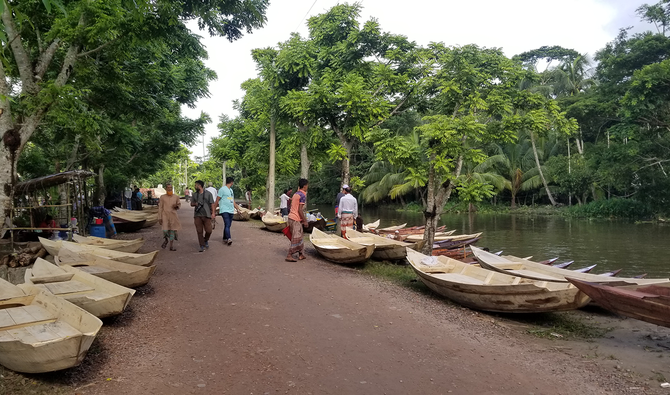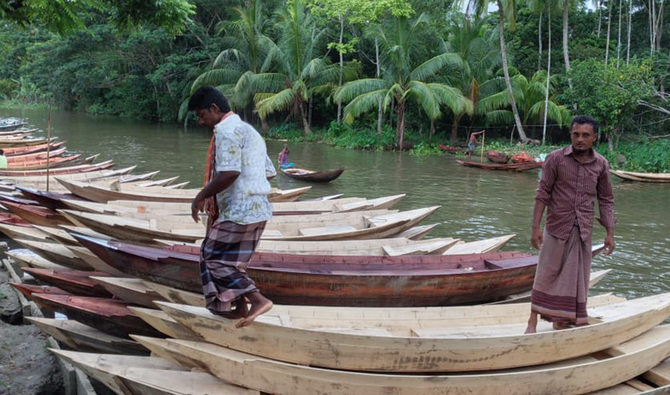DHAKA: For a few hours every Friday, thousands of residents throng to a 100-year-old boat market in Bangladesh’s Pirojpur district, as the monsoon continues to inundate low-lying areas in the country and water levels rise from the incessant rain, forcing many to reimagine conveyance options.
The vessels at the Atghar boat market — the largest in the country and located along the banks of the Sandhya River in the Pirojpur district, nearly 264 km away from the capital Dhaka — serve as the only medium of travel for residents in the southern parts of the country, including in the Pirojpur, Jhalkathi and Barishal districts.
“The boat is part and parcel of our lives. Most of the houses in the low-lying areas go underwater during the rainy season, and boats are the only method of conveyance,” Mohammed Dalil Uddin, 72, told Arab News while scouring the Atghar boat market for a new vessel.
Bangladesh is a riverine country, surrounded by the Padma, Jamuna, Dhaleswari, Ichhamati and Kaliganga rivers, which become problematic during the monsoon season when floodwaters disrupt life and communication for thousands of villagers.
And while each family buys at least one boat, others visit the market in keeping with tradition.
“I first visited this boat market with my grandfather when I was only 7 years old. Now, it’s become a tradition,” Dalil Uddin said.
Another buyer, Kamran Ahmed, from the Jhalkathi district, said he is in dire need of a new boat as “the existing one has become old and unusable.”
“I need to carry cattle feed from a long distance during monsoon season since the grazing fields in my village went under river water. Besides, I need to use this small boat for harvesting my guava from the orchard,” Ahmed, 59, told Arab News.
The boat market operates on goodwill; traders cater to the needs of the customers by crafting boats that are long-lasting and reasonably priced.
The average vessel length is between 7 to 8 feet, while the prices vary from $20 to $60, depending on the quality and size of the boats.
“We can provide the boats at a cheaper rate since wood is readily available in this part of the country. Besides, this wood tree has no other use, and we can’t use it for making furniture,” Ramesh Saha, 62, a trader at the boat market, told Arab News.
He added that for a majority of the traders, work involves managing a family business that has been passed down from one generation to another.
“My father used to sell boats in this market. Now I am running the family business, and my son is also assisting me,” Saha said.
He is one of nearly 100 families from the nearby villages of Muktahar, Chami, Boldia, Inderhaat, Boitha Kata, Dubi and Kathali who specialize in the craft of boatmaking, which takes an average of “one to two days per vessel to make.”
“Sometimes, it takes a little longer, depending on how large the boat is,” Akbar Hossain, 54, a trader, told Arab News, adding that it is vital for these boats to be “very light” as it makes them easy to stay afloat.
And while the traders usually sell around 100 to 200 boats every Friday, Hossain said the outbreak of the coronavirus disease (COVID-19) has impacted these numbers.
“People are not coming out of their homes unless it’s an emergency,” he said.
The market also attracts several tourists from various parts of the country.
“It’s amazing to witness hundreds of boats kept in a row on the river water and streets, waiting to be sold,” Raihan Faruk, a private university student from Dhaka, told Arab News.
“For me, it’s the experience of a lifetime. Once I return to Dhaka, I will tell my friends to visit this market too,” he added.



























